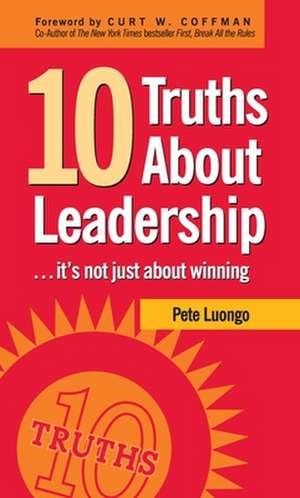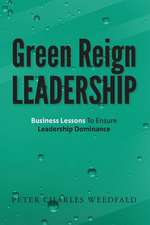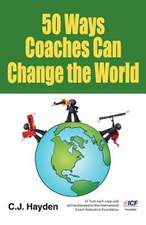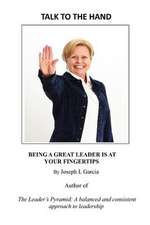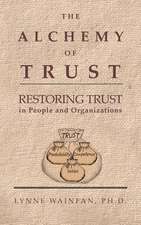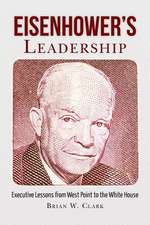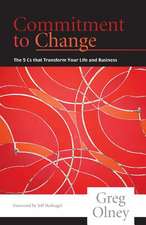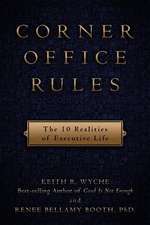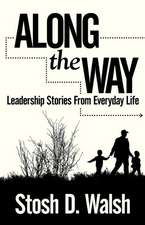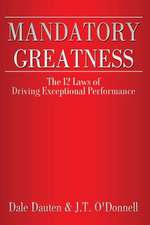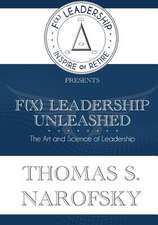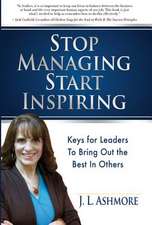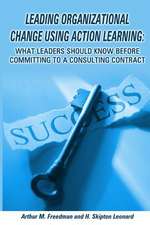10 Truths about Leadership: It's Not Just about Winning
Autor Peter A. Luongo Curt Coffmanen Limba Engleză Hardback – 31 iul 2007
Many leaders remember those life-changing moments when it suddenly became crystal clear what had to be done to reach their organizations' goals. It wasn’t until Pete Luongo was faced with that one epiphany in his life, a difficult period that required him to rebalance life’s priorities and bring a new understanding to his work, that he recognized that all results are based upon behaviors appropriate to the circumstances. Through this understanding — that actions are determined by specific, well-defined standards — he developed a model for success, one that is both sustainable and that allows people to retain their personal dignity as they pursue their life plans. In this book, Luongo illuminates the ten most common obstacles to success and pairs them with the ageless principles that help readers overcome them. His straightforward advice, based on data and hard-won experience, provides an understandable and virtually guaranteed plan for improvement and achievement.
Preț: 111.96 lei
Nou
Puncte Express: 168
Preț estimativ în valută:
21.43€ • 22.29$ • 17.69£
21.43€ • 22.29$ • 17.69£
Carte disponibilă
Livrare economică 24 martie-07 aprilie
Preluare comenzi: 021 569.72.76
Specificații
ISBN-13: 9781578603022
ISBN-10: 1578603021
Pagini: 189
Dimensiuni: 135 x 186 x 19 mm
Greutate: 0.38 kg
Editura: Clerisy Press
Locul publicării:Canada
ISBN-10: 1578603021
Pagini: 189
Dimensiuni: 135 x 186 x 19 mm
Greutate: 0.38 kg
Editura: Clerisy Press
Locul publicării:Canada
Extras
Chapter 2 - Leaders Know
Finding and keeping good people must be a personal priority for every individual in the organization. I once asked a large group of first- and second-level sales managers at The Berry Company how many of them had personally recruited a salesperson, just one, over the last twelve months. The question produced a paltry twenty-five percent show of hands. The truth is, even in companies where hiring and retaining good people is the number one priority, this focus can still slip away in the hectic pace of business if it is not constantly reinforced.
I’ve never been opposed to college recruiting, job fairs, online recruiting, newspaper ads, and so on. While I support these resources as part of a recruiting strategy, too often they are the painful result of not effectively engaging your employees in the recruiting and selection process.
Your best employees are your best recruiters. Why? First, who knows the job and what’s required to be successful better than your best people? Second, “winners run around with winners!” With high levels of employee engagement, you will increase your odds of attracting those prospective employees who are experiencing success in their own careers but weren’t aware of the wonderful opportunities awaiting them at your company. I always loved to disrupt people’s lives by making them aware of what they were missing by not being at Berry!
To quote Aristotle, “We are what we repeatedly do. Excellence, then, is not an act, but a habit.”
Chapter 11 - Leaders Encourage Self-Acceptance and Acceptance of Others
First, help every individual you supervise to be more than they can be…and not something they’re not. Secondly, each and every day, strive to make a difference in someone’s life. Take that responsibility seriously and recognize that being in a position of leadership is a gift and a blessing. Upon retirement, I was fortunate to have a number of recognition events in my honor. As I reflected on the many wonderful things that were said and written, there was not one reference to the number of quotas made or missed, the number of times we made our net income, and only a few references to our many contract acquisitions during those last nine years.
Since retirement, I have had the privilege of maintaining contact with a number of our employees. There has never been mention of quotas made or missed, the number of times we made our net income, and only a few references to our many contract acquisitions! Every memory, reflection, or gesture of thanks has to do with the fact that in some small way, I made a difference in their lives. In the end, that’s how all of our lives are judged.
I have a priest friend who has administered last rites on hundreds of occasions. He will be quick to tell you that in sharing those last moments of life, no one has ever expressed regret about not making enough quotas or spending more time at work. They talk about wishing they would have cared more, loved more and gave more. It’s a sobering thought, but one we all need to address now, not when it’s too late!
In the final analysis, there is nothing more important than being important to someone. I’ve heard it said “to the whole world we may be one person, but to one person we could be the whole world.”
I’ve avoided discussing my involvement in a number of community activities previously, but it’s appropriate to mention here. As current Chair of the United Way Board for our three counties and campaign chair in 2003, I have visited over sixty-five agencies that are part of the United Way network. During these trips, I witnessed true hopelessness for the first time in my life. Not hopelessness in terms of a terminal illness, which some of us have unfortunately dealt with, but rather hopelessness from pure, utter despair by people who were either born into a circumstance or have fallen upon hard times and have little chance of getting out.
Along the way, I’ve met amazing people who perform tiny miracles every day because they take the time to care. I’m convinced every problem in this world can be solved if someone cares enough. The lesson here is simple and straightforward.
Corporations do not fail or succeed because of the economy, competition, or emerging technology. They fail because of their inability to care. Their inability to respond is purely the result of the lack of focused energy inside their four walls as a result of not accepting each other and the God-given talent we all bring to relationships. It’s really simple, it’s just not easy!
Finding and keeping good people must be a personal priority for every individual in the organization. I once asked a large group of first- and second-level sales managers at The Berry Company how many of them had personally recruited a salesperson, just one, over the last twelve months. The question produced a paltry twenty-five percent show of hands. The truth is, even in companies where hiring and retaining good people is the number one priority, this focus can still slip away in the hectic pace of business if it is not constantly reinforced.
I’ve never been opposed to college recruiting, job fairs, online recruiting, newspaper ads, and so on. While I support these resources as part of a recruiting strategy, too often they are the painful result of not effectively engaging your employees in the recruiting and selection process.
Your best employees are your best recruiters. Why? First, who knows the job and what’s required to be successful better than your best people? Second, “winners run around with winners!” With high levels of employee engagement, you will increase your odds of attracting those prospective employees who are experiencing success in their own careers but weren’t aware of the wonderful opportunities awaiting them at your company. I always loved to disrupt people’s lives by making them aware of what they were missing by not being at Berry!
To quote Aristotle, “We are what we repeatedly do. Excellence, then, is not an act, but a habit.”
Chapter 11 - Leaders Encourage Self-Acceptance and Acceptance of Others
First, help every individual you supervise to be more than they can be…and not something they’re not. Secondly, each and every day, strive to make a difference in someone’s life. Take that responsibility seriously and recognize that being in a position of leadership is a gift and a blessing. Upon retirement, I was fortunate to have a number of recognition events in my honor. As I reflected on the many wonderful things that were said and written, there was not one reference to the number of quotas made or missed, the number of times we made our net income, and only a few references to our many contract acquisitions during those last nine years.
Since retirement, I have had the privilege of maintaining contact with a number of our employees. There has never been mention of quotas made or missed, the number of times we made our net income, and only a few references to our many contract acquisitions! Every memory, reflection, or gesture of thanks has to do with the fact that in some small way, I made a difference in their lives. In the end, that’s how all of our lives are judged.
I have a priest friend who has administered last rites on hundreds of occasions. He will be quick to tell you that in sharing those last moments of life, no one has ever expressed regret about not making enough quotas or spending more time at work. They talk about wishing they would have cared more, loved more and gave more. It’s a sobering thought, but one we all need to address now, not when it’s too late!
In the final analysis, there is nothing more important than being important to someone. I’ve heard it said “to the whole world we may be one person, but to one person we could be the whole world.”
I’ve avoided discussing my involvement in a number of community activities previously, but it’s appropriate to mention here. As current Chair of the United Way Board for our three counties and campaign chair in 2003, I have visited over sixty-five agencies that are part of the United Way network. During these trips, I witnessed true hopelessness for the first time in my life. Not hopelessness in terms of a terminal illness, which some of us have unfortunately dealt with, but rather hopelessness from pure, utter despair by people who were either born into a circumstance or have fallen upon hard times and have little chance of getting out.
Along the way, I’ve met amazing people who perform tiny miracles every day because they take the time to care. I’m convinced every problem in this world can be solved if someone cares enough. The lesson here is simple and straightforward.
Corporations do not fail or succeed because of the economy, competition, or emerging technology. They fail because of their inability to care. Their inability to respond is purely the result of the lack of focused energy inside their four walls as a result of not accepting each other and the God-given talent we all bring to relationships. It’s really simple, it’s just not easy!
Notă biografică
Pete Luongo retired as President and CEO of the The Berry Company in August of 2003, a career that spanned more than thirty-three years. During his last nine years, he was part of the team that led the billion-and-a-half dollar yellow page advertising agency through a period of record sales growth, numerous contract acquisitions, and the perpetuation of the nearly one-hundred-year-old company as an industry leader as well as "a great place to work." While his goal of giving back has encompassed many pursuits, none is more important than taking his 10 Truths About Leadership to organizations throughout the world. An accomplished business leader, corporate strategist and compelling communicator, his message transcends business transformation, emerging technology, product innovation, and strategic imperatives.
Cuprins
Introduction
Leaders Care but Never Compromise
Leaders Know the Value of Good People
Leaders Inspire Rather than Motivate
Leaders Provide Support
Leaders Set Specific Expectations
Leaders Create Leaders, Not Followers
Leaders Provide Honest Feedback
Leaders Breed Trust
Leaders Foster Commitment
Leaders Stimulate Loyalty
Leaders Encourage Self-Acceptance and Acceptance of Others
Final Thoughts
